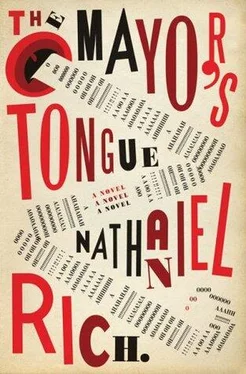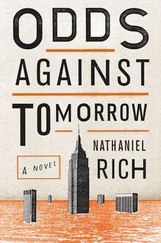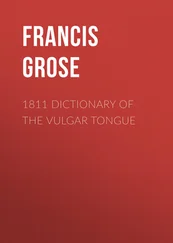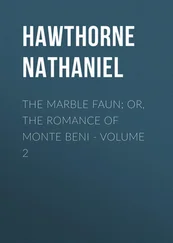Eugene ambled half-awake from his ramshackle hotel onto Via San Lazzaro like a man reborn. Via San Lazzaro was a narrow side street lined with shuttered storefronts: a cramped haberdashery, a Chinese restaurant, and a chandlery bursting over with plastic incubators, encyclopedia sets, and silver espresso canisters. Despite all the clutter, none of the stores looked as if they had been opened, let alone visited, in a long time. Everything was faded and dusty. It was so quiet that Eugene could hear the muted sounds of families preparing to eat — the tinker of a pot and a tired man's appreciative mumble — from the open windows above the street. He looked again at the two pieces of paper he was holding in his hands: a city map supplied by the tourist office at the train station, and a scrap of envelope on which Abe had written, in his wobbly chicken-scrawl cursive:
Frank Lang,
A Friend
Libreria Antiquaria Constantino Eakins
30b via San Nicolò
A nice man
FIND ALISON!
There was a sudden patter on the cobblestones. A pair of young girls in frilly white tulle dresses raced around the street corner and shuttled wordlessly into a nearby doorway. Eugene waited for the sound of a shutting door but heard nothing. Finally, one of the girls poked her head out of the doorway, her large brown eyes fixing right on Eugene.
"Ciao ciao," he said, waving awkwardly. The girl bristled but stood her ground. On the corner behind her, a large clumsy insect flew into a white streetlamp, exploding in a loud buzz and bright flicker. The girl said, "Xe el cinciut?"
"Mi scusi, cara?" he replied, squinting.
"Aio!" she squealed, and disappeared again. A few moments later, a small parcel flew from the doorway and landed in the middle of the street. From a distance it appeared to be some kind of purple fruit strung with feathers. A breeze sent the parcel slowly cartwheeling up the alley, tripping on a raised cobblestone before settling near his feet, against the base of the streetlamp. He looked closely and saw a crushed beak, matted feathers, a twisted wing. A door slammed shut loudly behind him and, in a panic, he started running.
After several minutes he turned onto Via San Nicolò, and found the single unlit window of Frank Lang's bookstore. There were several browned volumes on display, including a tattered edition of poems written by a Triestine author in the local dialect with a translation into Florentine Italian on facing pages, and a green leather Slovenian hardcover whose cover sketch depicted two old men sitting on the edge of a cliff. Cupping his hands over his eyes and leaning against the glass, Eugene could make out enormous bookshelves, standing nearly two stories high. They hemorrhaged their contents into piles of varying size and bulk scattered about the floor. It reminded Eugene of Abe's office, only it was twice as big, and filled with four times as many books. A ladder on casters leaned against one shelf, and a red mahogany rolltop desk was just visible in the back of the room, where it seemed to sag under a pyramidal stack of art books and overstuffed string-bound manuscripts.
Eugene gently rapped on the door, waited several minutes for a response, then rapped again, harder. A group of emaciated stray cats stirred in an alley behind him, their white felt ears tensing in expectation. It occurred to Eugene that, in his fugue of travel, he was unsure whether it was dawn or dusk. Just as he turned to set back to his ratty two-star motel, a heavy volume fell from the wobbling pile at the edge of the desk, and landed with a loud smack on the floor. A hairless head butted into view and recoiled. There was some shifting and grumbling and the crash of more books before the man appeared again, right behind the glass door. He was short, almost miniature — his thin blond mustache was even with Eugene's collar — and his delicate spectacles rimmed hungry, staring eyes. He rapped on the glass right back at Eugene.
"Ma chi sei? Che cosa vuoi?"
"Mi scusi, sono Eugenio. Lavoro per Signor Abe Chisholm."
"So you're the American," replied the man loudly, in a clean New York accent. He pinched his cheeks to wake himself up. They turned pink.
"I hope I'm not disturbing you," said Eugene.
"Sorry?"
"I HOPE I'M—"
"Hold on," said the man. He opened the door, which had not been locked.
"I hope I'm not disturbing you," Eugene repeated. The fusty air of the bookstore wafted over his face like a warm exhalation; he was reminded of Abe's breath.
"You were sent by Abe?" said Lang. His voice was a high, laughing trill. "Abe is a friend. A nice man. Ah yes, so you're the boy? And what a darling boy you are. Tell me, would you like some coffee? Is Abe in good health?"
"Mr. Frank Lang?"
"That's me. But here they call me Signor Lingua." Lang grinned like a jackal, and something in his jaw clicked like the second hand of a watch: ticktock, ticktock.
Lang turned a knob on the wall and little electric candles, mounted in frosted green glass on the columns between bookshelves, flared up, soaking the room in a queasy Adriatic hue. Tens of thousands of books sprang into existence all around Eugene. As he followed Lang across the room, the creaky floorboards caused the nearby stacks to teeter slightly, so that they seemed to exhale dust.
"I was just sitting in my chair, preparing some notes for a conference I've been asked to organize, and I must have dozed off," said Lang. "I am so absentminded. It's a good thing you woke me, otherwise I surely would be. ." And here he paused for comic effect, brushing his mustache down with his forefinger and smiling mischievously.". . Still sleeping."
Lang cleared off a stool next to his desk and invited Eugene to sit. When the little man moved behind his desk, Eugene could see that he walked with a pronounced bowleg.
"You arrived. .?"
"Oh, today. Or yesterday. I'm not quite sure. I was so exhausted that I fell asleep in my clothes. When I woke up, I came straight over here."
"Watch out for sleep. It can be a dangerous thing, you know."
"Mmm?"
Lang turned solemn. He adjusted his spectacles and swept his wispy blond hair off the bald center of his scalp.
"I have," he confided in a stage whisper, "a sleeping disorder."
"I'm very sorry to hear that."
Lang nodded gravely." I've had it for nearly ten years. A sleeping sickness. You see, I just can't seem to keep myself from sleeping at times."
"Narcolepsy?"
"No, no, no. I don't just drift off in the middle of a sentence or fall headfirst into a bowl of spaghetti. I have some self-control. But take just now. I was sitting at my desk, at that quiet time of day I normally reserve for studying and updating my journals. I hadn't slept for many hours, and suddenly — you are knocking on the door. You see, I had fallen asleep. Just like that. It's as if I had been. . enchanted."
"That doesn't seem too unusual," said Eugene. "When you're tired, you're tired."
"No, no, no. I come from a long line of people — cliff dwellers we are — who do not sleep. Up in the morning and up late at night, always busy. An industrious people," said Lang, busily ticktocking.
"Farmers?"
"Some, I suppose. But there are many others of us who could easily blend in in any major cosmopolitan city. We're a highly adaptable group. Sleeplessness is really a fine quality to possess. But ever since I left the village about a decade ago, I've had terrible trouble sleeping. The feeling alone disturbs me, that sensation of drifting, helpless and mindless, off to oblivion. It's not like eating, for instance, which one can do quickly and in conjunction with other, more useful activities."
It didn't appear, however, that Lang had done much eating either. His throat was as tight as a newt's, and the shapes of his ivory-white teeth were imprinted on his lips when he closed his mouth, so thin was his skin. Still, in the warm knowingness of his jackal smiles — which ended in a mock-serious, self-deprecatory curl at the corners of his mouth — and in the fluttery movements of his slender, tapering hands, he reminded Eugene of somebody he had once met.
Читать дальше












